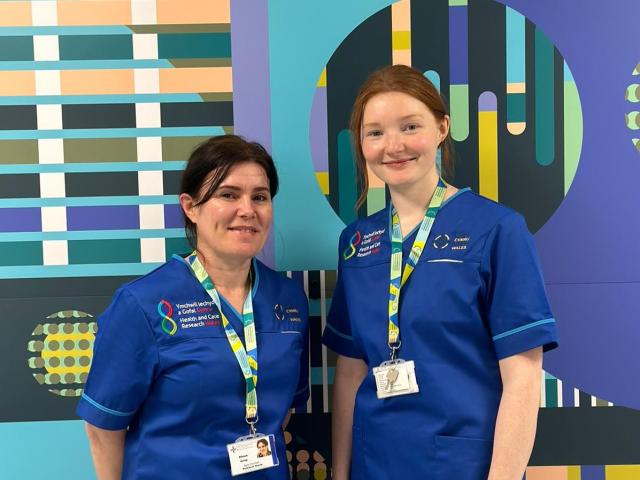
It’s not all about blokes in lab coats; research nurses redefining the approach to participation in mental health research
15 May
Emily Barnacle and Rhian Gray, Mental Health Clinical Research Nurses at Aneurin Bevan University Health Board, are passionate about making a difference to people's lives and mental wellbeing. They wanted to share their research story for this year’s International Clinical Trials Day (ICTD) on Saturday 20 May.
As mental health clinical research nurses, they support participants with complex mental health conditions who are receiving treatment or intervention as part of a clinical trial. The scope of mental health conditions covered by their research ranges from old age psychiatry, such as dementia and Alzheimer’s disease, to psychosis, anxiety and depression.
Research nurses are crucial to educating the community and raising awareness about the importance of mental health research. They aim to highlight how mental health conditions can impact anyone.
Emily said: “I originally trained as a paediatric nurse and qualified in 2021, but I have always been interested in shaping mental healthcare. Once I saw the opportunity to become a mental health clinical research nurse, I made the switch and I love it."
Rhian said: "For 20 years, I worked as a mental health nurse on the wards. Unfortunately, I saw the same treatments and processes being used repeatedly, with little progress made in mental health. I developed a passion for making a change, and when this job opportunity arose, I went for it."
Reshaping mental health clinical trials into community home visit trials is so important to the wider scope of Welsh mental health research.
Emily and Rhian strive to establish a caring, understanding and well-informed atmosphere to strengthen clinical trials in mental health and encourage this approach across all research areas. They are directly involved in the trial process from start to finish, working with various professionals to successfully coordinate the setup, delivery and closure of studies.
Emily said: “Our research department’s trials take a non-standard approach as they are home visit based. The people involved in our studies often experience chaotic lifestyles; it is unlikely they would be able to participate in a trial if it meant them having to come to a specific clinic or research department. So, we take the research to them. We undertake prearranged home visits or go out for a coffee and a cake for a chat."
Rhian added: “Our approach to assessment isn't like a formal interrogation across a desk. We ask all the necessary questions, but in a conversational manner and aim to conduct research in a way that collects data efficiently and within appropriate boundaries."
Rhian said: “We're proud of the work we're doing. We strongly believe in taking a compassionate approach to building strong relationships with participants.
"Our approach is less clinical and is more about finding out who you are as a person. We want to get to know you and see if we can do anything to help. This approach enables us to form good relationships with our participants to establish trust and honesty which has led to overall high attendance outcomes throughout the trials."
Rhian said: “I’d recommend participating in research to everyone. It can be a fun experience and something they can look back on and be proud to know they helped change things for future generations.”
Where would we be without research?
Sign up for Today’s Research newsletter to find out how you can help or take part in research.
Health and Care Research Wales funds research delivery across all NHS organisations in Wales.